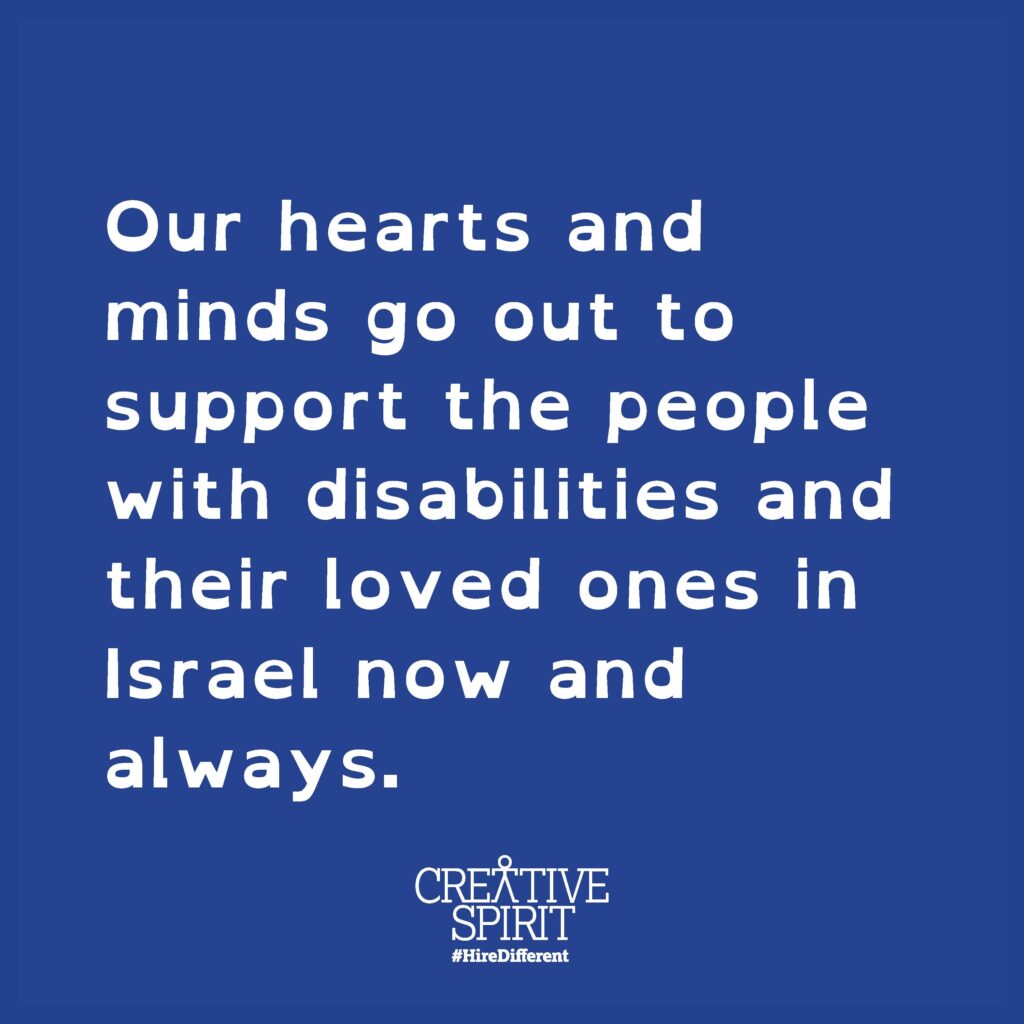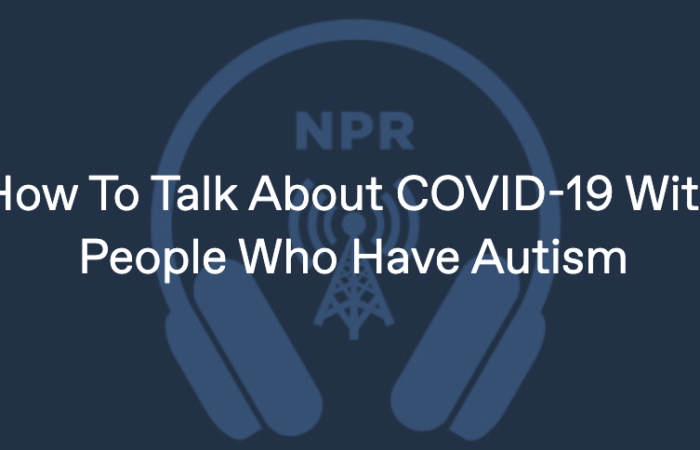Written By Menachem Rephun, Communications Manager, Creative Spirit; Designed by Chris Jarrin, Art Director Creative Spirit, and Joanna McElnea, Community Manager Creative Spirit and Advocate
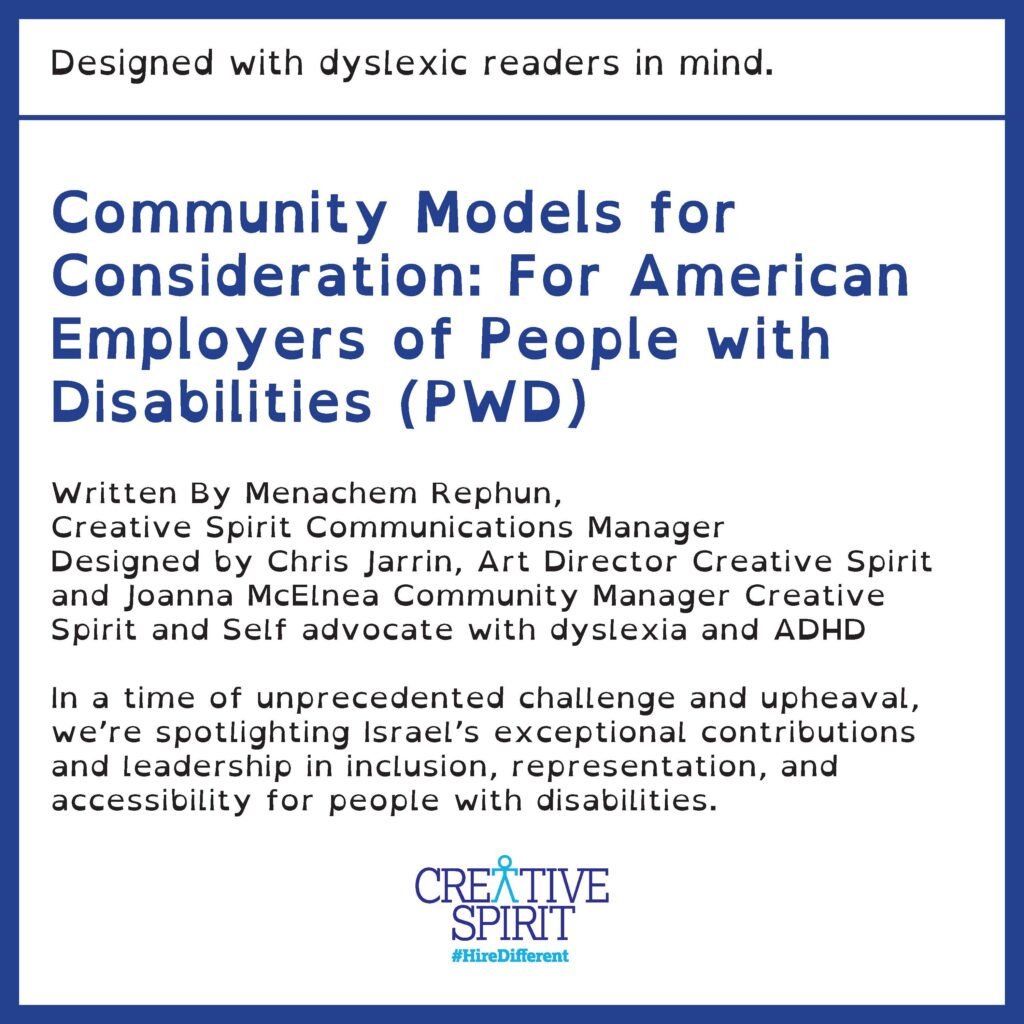
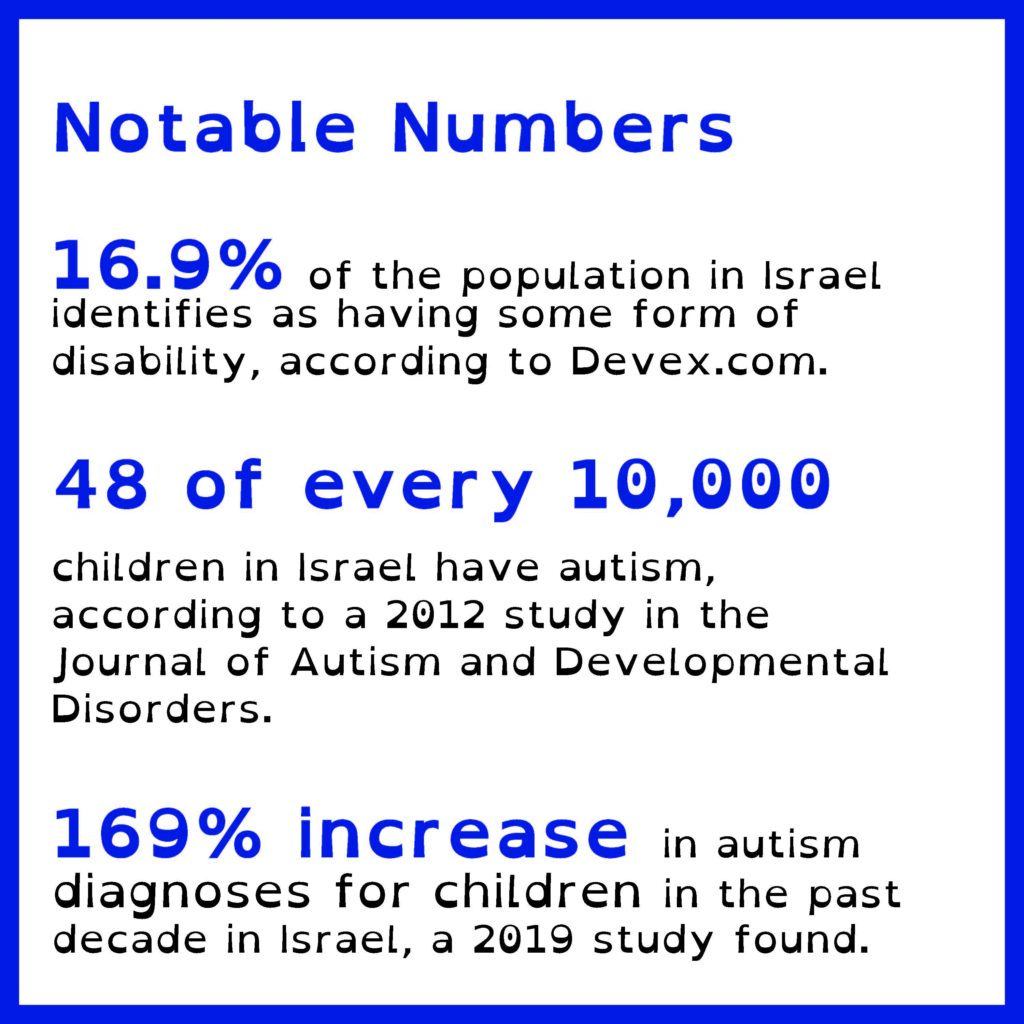
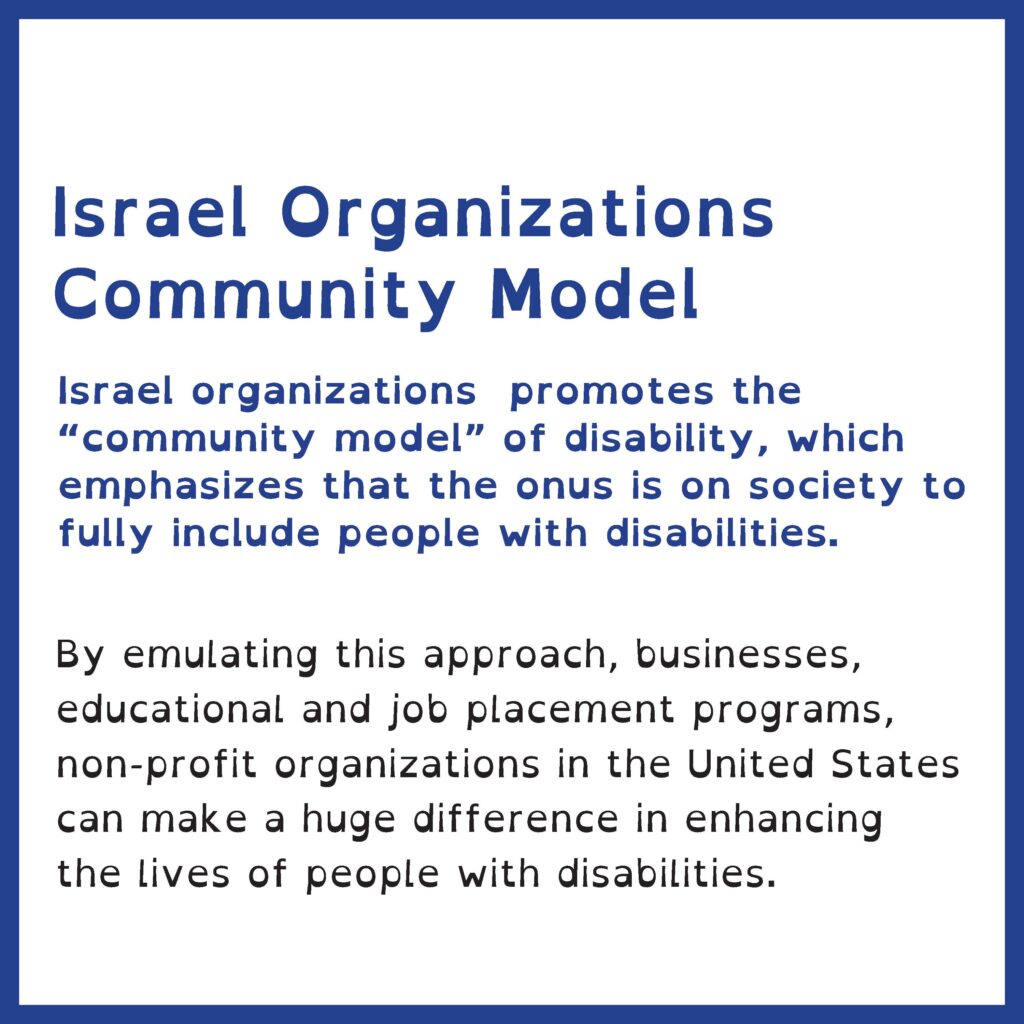
As the war in Israel continues, one area that has been under-publicized is Israel’s longstanding commitment to disability rights and the Model of Inclusion. Through our work in the U.S., we’ve had the opportunity to learn about and develop a deep appreciation for Israel’s vital contributions and leadership in the inclusion, accessibility, and representation of people with disabilities from all walks of life. We fervently hope that the conflict will not harm or disrupt Israel’s important disability rights advocacy and efforts. War devastates entire societies, but its impact on marginal populations is always profound. In this article, we’ll spotlight Israeli organizations and initiatives for disability rights, how they’re leading the way forward, and what other companies and business leaders can learn from their approach.
Bizchut
Roughly 16.9% of the population in Israel identifies as having some form of disability, according to Devex.com. Among the numerous disability rights organizations in Israel, one that stands apart in its longevity and the impact of its contributions is Bizchut (“By Right”), a nonprofit with the distinction of being Israel’s longest-running organization advocating for the rights of people with disabilities. According to Washington Jewish Week.com, Bizchut “combines legal tools and community advocacy to fight for everyone with a disability, regardless of type or scope of disability, age, gender, ethnic or religious background.” Established in 1992 by the Association for Civil Rights in Israel, Bizchut was instrumental in passing the Equal Rights for People With Disabilities in Law, Israel’s equivalent of the landmark Americans With Disabilities Act (ADA), in 1998. Paralleling the American disability rights movement, the organization’s core principles include accessibility, independent living, personal autonomy, non-discrimination, and liberty for people with disabilities. “Depriving persons with disabilities of their liberty is often perceived to be legitimate,” Bizchut explains on its website. “Placement in closed institutions, use of physical restraints, isolation, placement in sheltered employment facilities, removing a person’s financial freedom, and more. Ensuring the right to liberty is the foundation for promoting the equality of persons with disabilities.” Bizchut’s values also align closely with those of the Independent Living Movement, which promotes freedom and autonomy for people with disabilities. As Bizchut points out, “Years of exclusion and tracking into segregated institutions, which remain par for the course in many services delivered to persons with disabilities, are countered by promoting independent living for each and every person with a disability.”
In addition to promoting independent living on the Model of Inclusion, Bizchut also exposes violations of disability rights within institutions, and promotes legislation to ensure equal rights and inclusion. The core goals and values of Bizchut also align with our own objectives at Creative Spirit, such as improving accessibility and inclusion for neurodiverse individuals, and ending unjust policies like subminimum wage for people with disabilities. Along with its role in passing the Equal Rights for People With Disabilities in Law, Bizchut has been involved in mental health reform, deinstitutionalization, access to textbooks for blind students, reducing the use of physical restraints in psychiatric hospitals, and much more. Most importantly, Bizchut represents a model for integration and independent living, proving that people with developmental disabilities can and should be integrated into mainstream society.
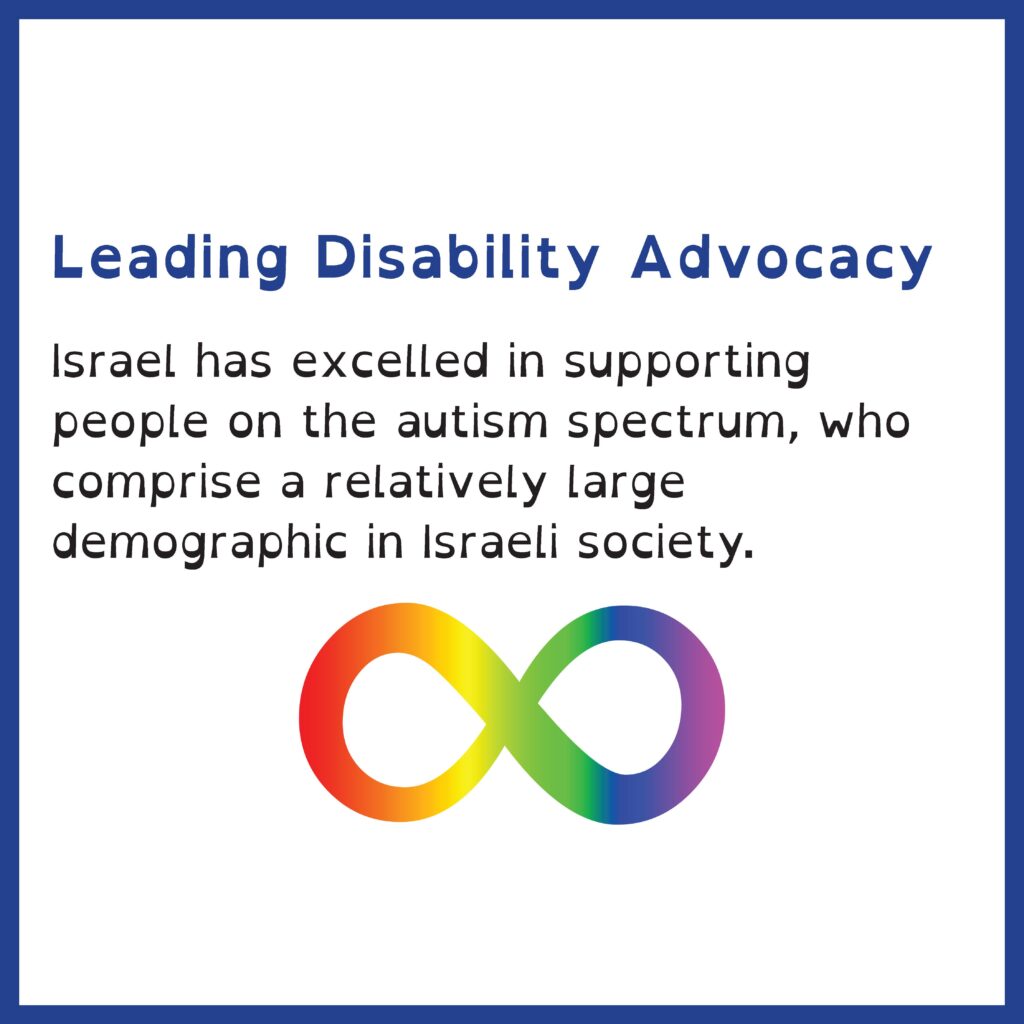
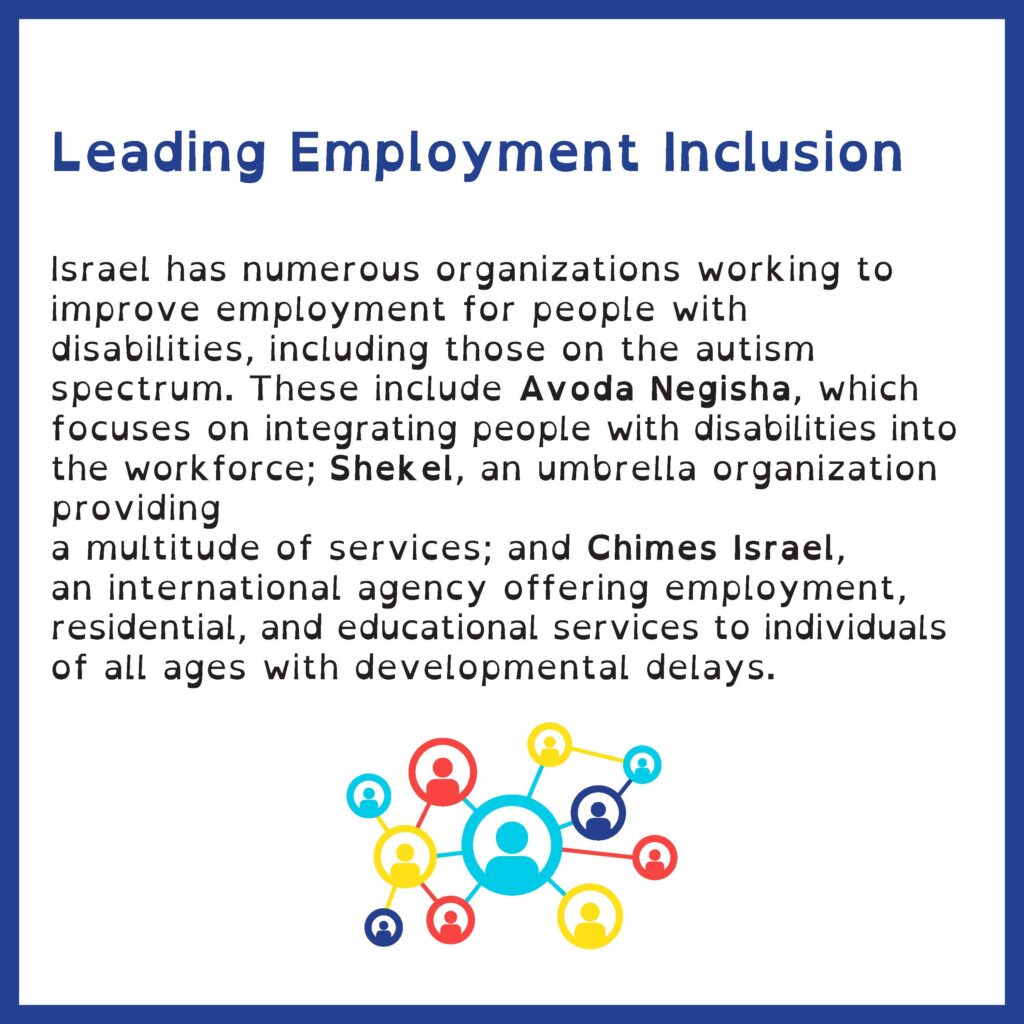
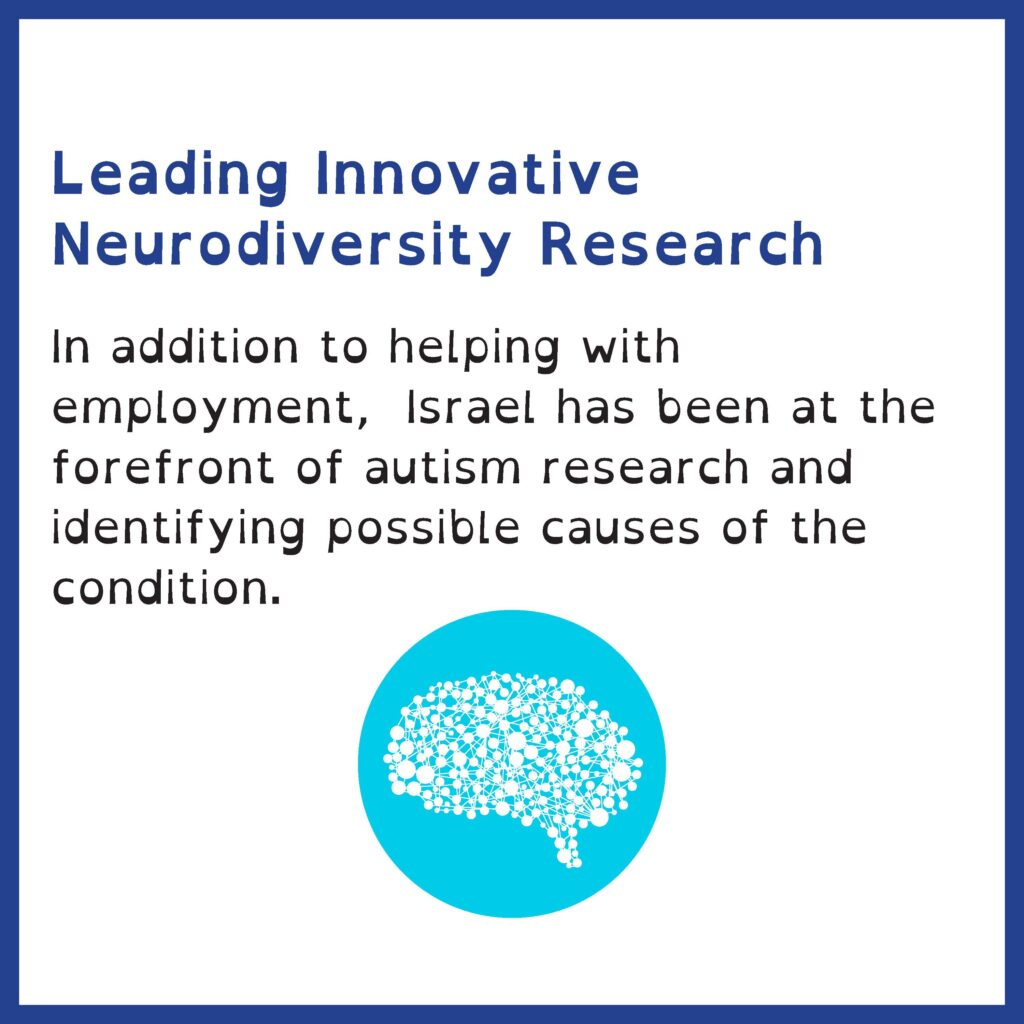
Helping Children and Adults With Autism Spectrum Disorder (ASD) and Model of Inclusion
One area of disability advocacy, mentioned in the Model of Inclusion, where organizations in Israel have excelled is in supporting people on the autism spectrum, who comprise a fairly large demographic in Israeli society. In 2012, a study in the Journal of Autism and Developmental Disorders found that 48 of every 10,000 children in Israel have autism. A 2019 study found that autism diagnoses for children in Israel jumped 169% in the past decade. One of the many Israeli organizations at the forefront of autism advocacy is Alut: Israeli Society for Autistic Children. A nonprofit established in 1974 by parents of children with autism, Alut provides support for children in Israel diagnosed with autism and PDD (Pervasive Developmental Disorder), as well as their families. According to Nefesh B’Nefesh.org, Alut offers “educational, residential, vocational and leisure-time services to people with autism and works to advance their rights and to improve the services available to them and their families.” The organization has also established rehabilitation and occupational centers for adults; residential homes for people with autism; individualized educational programs (IEP) and special education services at nurseries and treatment centers for toddlers; professional training for specialists working with children and adults with autism; and much more. According to its website, Alut currently has a staff of 2,500 and a network of 400 volunteers.
Another source of support for individuals in Israel Model of Inclusion on the autism spectrum is the Epi-Asperger’s Association Israel. Established in 2001, the organization initiates and operates employment, military recruitment, marital relationship, and social integration programs for people in Israel with Asperger’s Syndrome and high-functioning autism. Their database includes 3,500 members, information seekers, professionals, and various institutions. Israel’s National Autism Research Center, which consists of scientists from Ben Gurion University (BGU) and physicians from Soroka Medical Center, is also at the forefront of improving autism diagnosis and treatment by partnering with other leading medical centers and autism associations. According to AutismIsrael.org, their database contains comprehensive information from over 1,000 children referred to Soroka with possible traits of autism spectrum disorder.
Organizations in Israel have also been at the forefront of innovations in treating autism and identifying possible causes behind the disorder, which continues to baffle many researchers and medical experts worldwide. In 2023, researchers from the Hebrew University of Jerusalem identified a direct connection between autism and the levels of nitric oxide (NO) in the human brain. The researchers believe that inhibiting the production of NO could mitigate symptoms of autism, such as anxiety and repetitive behaviors, and could be used in the development of therapeutic drugs that could help millions of children and adults with autism around the world. 2021 also saw a major breakthrough in Israel’s autism advocacy with the founding of HackAutism, an organization that facilitates the creation of innovative technologies and startups to ease the daily lives of people with autism and their families. HackAutism’s founder, Rimon Tubin, was motivated by the desire to help his own son Yuval, 22, who is on the autism spectrum, as well as others with autism worldwide. “If the Start-Up Nation is so good at technology, entrepreneurship and innovation, why can’t people with disabilities also benefit?” Tubin asked, according to a report by JNS.org
In addition to its research-based efforts, several Israeli organizations have been equally active in their efforts to improve employment for people on the autism spectrum. Taglit-Birthright, a program offering a free trip to Israel for young Jewish Americans, also offers trips catering specifically to young adults with autism. This year, participants visited MobilEye, an Israel-based developer of autonomous driving technologies, which has stepped up the inclusion of employees with autism in its workforce. Point.AI, a Tel Aviv-based data annotation company, exclusively hires employees with high-functioning autism, due in part to their curiosity, talent for recognizing patterns and details, and strong work ethic. “I am learning skills and building my confidence,” one employee was quoted as saying in a report by Israel21c.org. “And outside of work, they spend time helping us grow, like working through problems and becoming better people overall”. The Israel Defense Forces (IDF) has also done its part to improve inclusion on the Model of Inclusion for people on the spectrum through its Visual Intelligence Division, or Unit 9900, which recruits individuals with autism for aerial analysis, allowing them to feel more included and accepted as part of Israeli society. Another crucial organization is Beit Eckstein, which prepares newcomers to Israel with Asperger’s Syndrome for independent living and provides training for employment. These are just a few of Israel’s autism inclusion efforts that can serve as a model for businesses and other countries to follow.
Other Efforts to Improve Employment Inclusion for PWD In Israel
Along with its support for the autism community, organizations in Israel have implemented efforts to help its broader population with disabilities, especially in terms of finding employment. One leading organization is Avoda Negisha, which focuses on integrating people with disabilities into the workforce, offering job listings, information, and tools through its website. Other notable initiatives include Shekel, an umbrella organization providing a multitude of services for children and adults with special needs, including education, community living, assessment and treatment, and vocational rehabilitation; Chimes Israel, an international, multi-service agency offering employment, residential, educational, and many other services to individuals of all ages with developmental delays; Kol Koreh, non-profit empowering children with dyslexia and other speech and language disorders; and many others.
These are just a few of the countless programs, organizations, and initiatives Israel has implemented to become a leader in accessibility and inclusion for the disabilities and neurodiverse community. Through these programs, Israel promotes the Model of Inclusion of disability, which emphasizes the imperative for society to accommodate and include people with disabilities, rather than the “medical model”, in which they perceive disability as a problem in need of being “cured”. It advocates that individuals with disabilities adapt to society rather than vice versa. In the U.S., only 4% of businesses have included people with disabilities in their diversity, equity, and inclusion (DEI) programs, according to Joshin.com. Misconceptions and stereotypes about disability also continue to be roadblocks to employment. Emulating these specific organizations’ approaches to inclusion for people with disabilities, especially in careers, businesses, and non-profit organizations in the United States, can overcome those barriers, significantly improving education and work for the disabilities community.
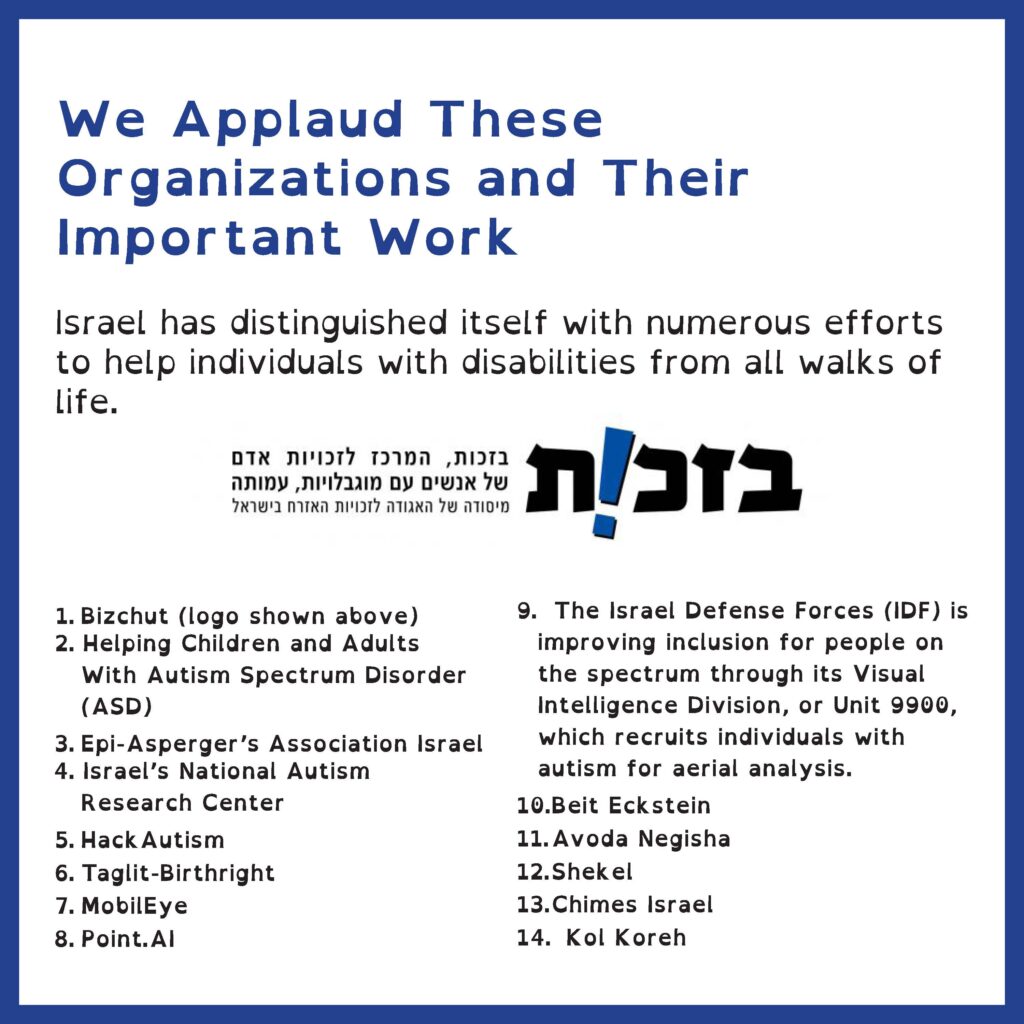
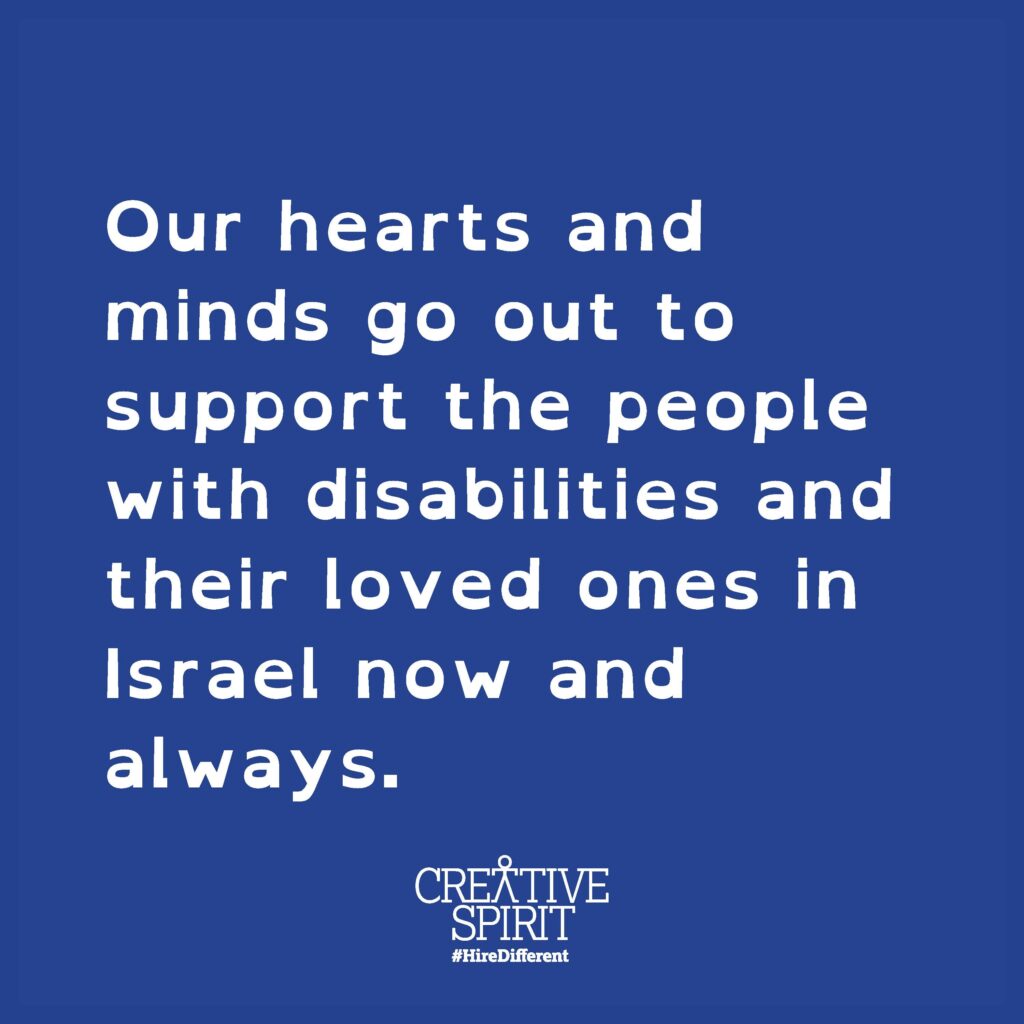
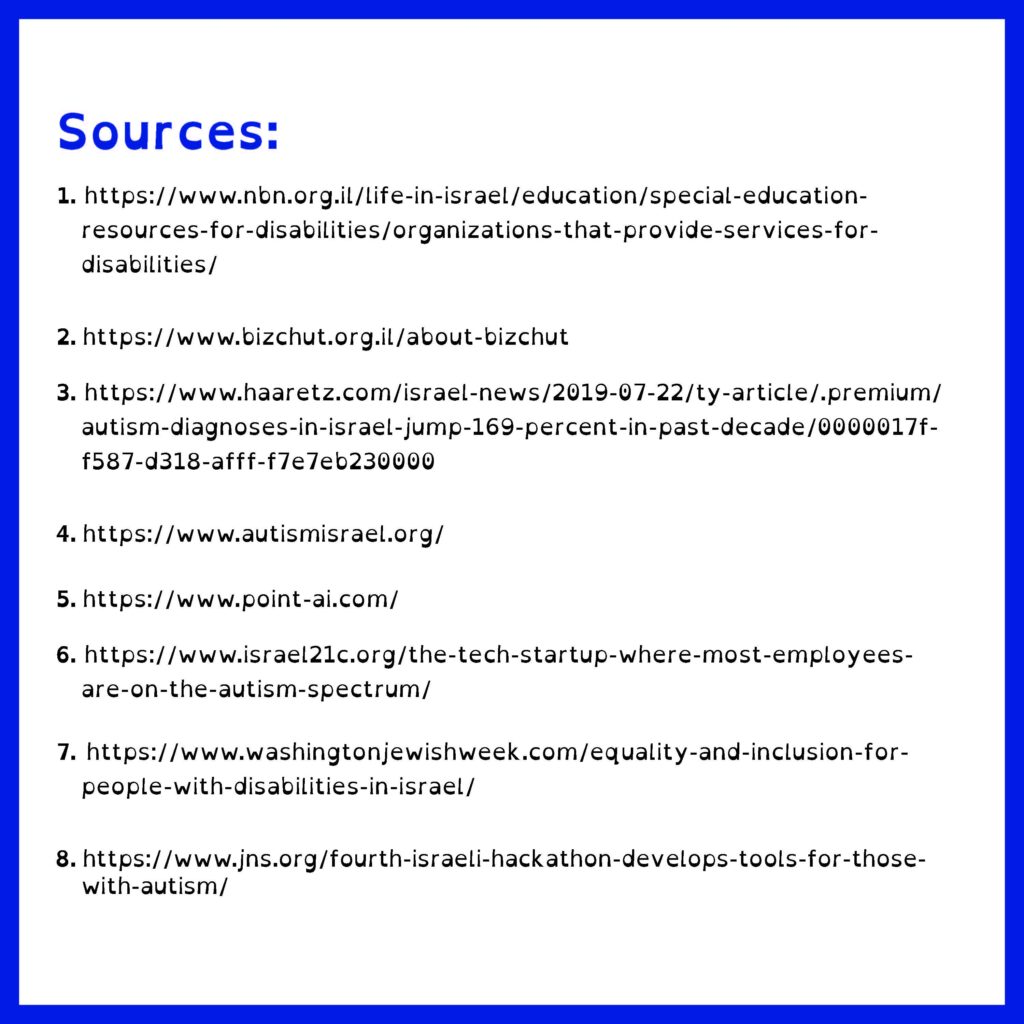
Sources:
- https://www.nbn.org.il/life-in-israel/education/special-education-resources-for-disabilities/organizations-that-provide-services-for-disabilities/
- https://www.bizchut.org.il/about-bizchut
- https://www.haaretz.com/israel-news/2019-07-22/ty-article/.premium/autism-diagnoses-in-israel-jump-169-percent-in-past-decade/0000017f-f587-d318-afff-f7e7eb230000
- https://www.autismisrael.org/
- https://www.point-ai.com/
- https://www.israel21c.org/the-tech-startup-where-most-employees-are-on-the-autism-spectrum/
- https://www.washingtonjewishweek.com/equality-and-inclusion-for-people-with-disabilities-in-israel/
- https://www.jns.org/fourth-israeli-hackathon-develops-tools-for-those-with-autism/
